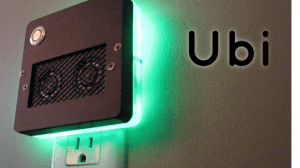
The ubiquitous computer
From HAL 9000 in Arthur C Clarke’s Space Odyssey science fiction saga to Eddie and Deep Thought from the Hitchhikers Guide to the Galaxy by Douglas Adams, or even Dr. Theopolis from Buck Rogers in the 25th Century, voice interaction with computers was very much the stuff of science fiction when I was growing up. These days, of course, I can use my voice to tell an iPod touch to change music or get convincingly beaten in a TV game show by IBM’s Watson but when shopping for a new computer, available options still depend on physical touch for input and visuals for output. The folks behind the ubiquitous computer (or Ubi for short) are hoping to change that by launching an affordable, unobtrusive and useful little box that’s always ready and waiting to tell you what you need to know.
The 4 x 4 x 1.1-inch (101.6 x 101.6 x 27.94-mm) Ubi plugs into a standard 100-240 VAC / 50-60-Hz power outlet and wirelessly connects to a home/office router using built-in 802.11b/g/n Wi-Fi technology (set up and configuration of the latter can be undertaken using voice, smartphone or PC). To the front of the unit is a power on/off button, under which are stereo speakers and an omni-directional microphone (with -40 dBV/Pa ±3 dB sensitivity in the working prototype but this may change). A user attracts Ubi’s attention by calling out its name.
Ubi uses voice recognition technology to listen for plain language commands, responding to requests in a synthesized voice or offering simple status updates using the multi-colored LED indicator lights. It’s been designed to synchronize with other Ubis in the home or office, and users should be able to move from room to room and interact with devices in different locations as though they were one unit.
Voice-enabled internet search, speakerphone (via Skype/Google Talk), intercom, home monitoring and home automation (through web-enabled hardware) are among Ubi’s initial use scenarios. The device also holds potential for in-home assistance for folks with mobility or sight problems and the development team of Leor Grebler, Amin Abdossalami and Mahyar Fotoohi says that other concepts currently being explored are mood, voice, and footstep recognition, room-to-room music piping, and environment modeling.
via Gizmag – Paul Ridden
The Latest Streaming News: Ubi updated minute-by-minute
Bookmark this page and come back often
Latest NEWS
Latest VIDEO







